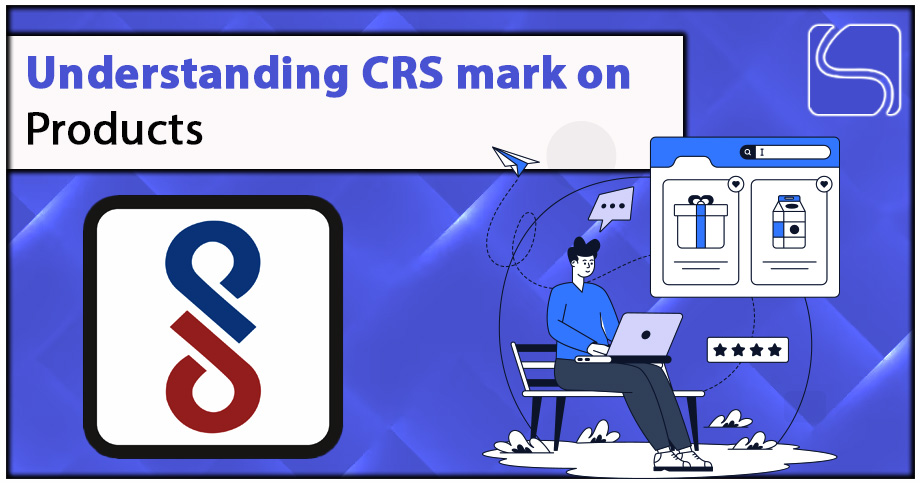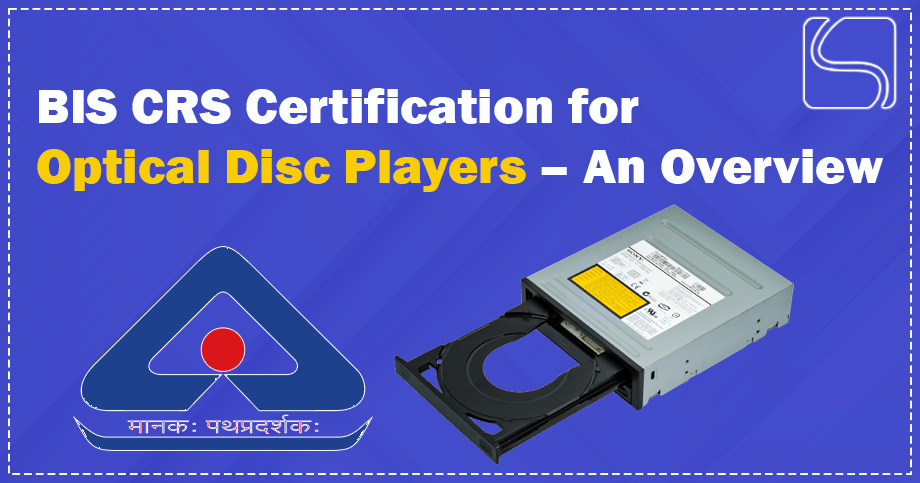Understanding CRS mark on Products

Shivam Narwal | Updated: Mar 17, 2023 | Category: BIS
Compulsory Registration Scheme (CRS) mark on products is a mandatory certification for certain goods sold in India. This mark, also known as the “Indian Standard” mark, ensures that products comply with certain safety, quality, and performance standards set by the Bureau of Indian Standards (BIS). In this blog, we will discuss the significance of the CRS mark and its application.
Table of Contents
What is the Compulsory Registration Scheme (CRS) mark?
The CRS mark is a certification mark issued by the BIS, a national standards body responsible for developing and promoting standards for products and services. The mark indicates that a particular product conforms to the relevant Indian standard and meets the minimum requirements for safety, quality, and performance.
Which products require the CRS mark?
The BIS has identified 158 products under the CRS mark, which includes electronic and IT equipment, household appliances, chemicals, construction materials, food and agricultural products, and others. Some of the commonly known products that require the CRS mark are:
- LED lamps and lights
- Mobile phones and batteries
- LPG cylinders and regulators
- Air conditioners and refrigerators
- Cement and steel
- Water heaters and geysers
- Automotive tyres
- Milk and milk products
- Medical equipment and devices
- Toys and games
It is mandatory for manufacturers and importers to obtain the CRS mark before selling or distributing these products in the Indian market.
How to obtain the CRS mark?
The process of obtaining the CRS mark involves several steps, including product testing, factory inspection, and certification. The following are the steps involved in obtaining the CRS mark:
- Submission of application: The manufacturer or importer must submit an application for the CRS mark to the BIS.
- Product testing: The product is tested by an accredited laboratory to ensure that it complies with the relevant Indian standard.
- Factory inspection: The BIS conducts an inspection of the manufacturing facility to ensure that the product is being manufactured under strict quality control measures.
- Certification: If the product meets the relevant Indian standard and the factory is found to be compliant, the BIS issues a certificate of conformity and permits the manufacturer or importer to use the CRS mark.
What are the benefits of the CRS mark?
The CRS mark offers several benefits to both consumers and manufacturers/importers. Some of these benefits are:
- Consumer safety: The CRS mark ensures that products meet the minimum safety requirements and pose no threat to the health and safety of the consumer.
- Quality assurance: The CRS mark guarantees that products meet certain quality standards and perform as expected.
- Competitive advantage: Manufacturers and importers who obtain the CRS mark can differentiate themselves from their competitors and gain a competitive advantage.
- Compliance with regulations: The CRS mark helps manufacturers and importers comply with the regulations set by the government of India and avoid penalties for non-compliance.
- International recognition: The CRS mark is recognized internationally and can help Indian manufacturers and importers expand their business in the global market.
What are the penalties for non-compliance?
Non-compliance with the CRS mark regulations can result in severe penalties for manufacturers and importers. The penalties can range from fines to imprisonment, depending on the severity of the violation. The following are the penalties for non-compliance:
- Fines: Manufacturers and importers who fail to comply with the CRS mark regulations can be fined up to Rs. 50,000 for the first offense and up to Rs. 1 lakh for subsequent offenses.
- Imprisonment: In some cases, non-compliance can result in imprisonment for up to three years.
- Seizure of goods: Goods that are found to be non-compliant with the CRS mark regulations can be seized by the authorities.
- Banned from importing or manufacturing: In severe cases of non-compliance, manufacturers and importers can be banned from importing or manufacturing the product.
It is, therefore, essential for manufacturers and importers to obtain the CRS mark before selling or distributing their products in the Indian market to avoid these penalties.
What are the challenges of obtaining the CRS mark?
While obtaining the CRS mark offers several benefits, it can also present some challenges to manufacturers and importers. The following are some of the challenges faced by manufacturers and importers when obtaining the CRS mark:
- Cost: Obtaining the CRS mark can be a costly process for manufacturers and importers. The cost of product testing, factory inspection, and certification can add up, particularly for small and medium-sized enterprises.
- Time-consuming: The process of obtaining the CRS mark can be time-consuming. The product testing and factory inspection process can take several weeks or even months to complete, which can delay the product launch.
- Lack of testing infrastructure: Some products require testing that may not be available in India, which can make it difficult for manufacturers and importers to obtain the CRS mark.
- Limited number of accredited labs: There are a limited number of accredited labs in India, which can make it challenging for manufacturers and importers to find an accredited lab to test their product.
- Language barriers: Some manufacturers and importers may face language barriers when obtaining the CRS mark, particularly if they do not speak Hindi or English, which are the official languages of India.
What is the process for renewing the CRS mark?
Manufacturers and importers must renew the CRS mark periodically to ensure that their products continue to comply with the relevant Indian standard. The following are the steps involved in renewing the CRS mark:
- Submission of application: The manufacturer or importer must submit an application for renewal of the CRS mark to the BIS.
- Product testing: The product is re-tested by an accredited laboratory to ensure that it continues to comply with the relevant Indian standard.
- Factory inspection: The BIS conducts an inspection of the manufacturing facility to ensure that the product is still being manufactured under strict quality control measures.
- Certification: If the product meets the relevant Indian standard and the factory is found to be compliant, the BIS re-issues a certificate of conformity and permits the manufacturer or importer to continue using the CRS mark.
How can manufacturers and importers ensure compliance with CRS regulations?
To ensure compliance with CRS regulations, manufacturers and importers should take the following steps:
- Understand the relevant Indian standard: Manufacturers and importers should familiarize themselves with the relevant Indian standard for their product.
- Choose an accredited lab: Manufacturers and importers should choose an accredited lab that can test their product and provide a test report that meets BIS requirements.
- Implement quality control measures: Manufacturers and importers should implement strict quality control[1] measures in their manufacturing process to ensure that their products comply with the relevant Indian standard.
- Keep records: Manufacturers and importers should keep records of their product testing and factory inspection to demonstrate compliance with CRS regulations.
- Seek professional guidance: Manufacturers and importers can seek professional guidance from consultants or experts who are familiar with the CRS mark process.
What is the future of the CRS mark?
The future of the CRS mark looks promising, as the Indian government is expected to expand the list of products that require the mark. The BIS has also announced plans to simplify the CRS mark process, making it easier and more cost-effective for manufacturers and importers to obtain the mark. The BIS is also expected to increase the number of accredited labs in India to make it easier for manufacturers and importers to find a lab to test their product. These developments are likely to encourage more manufacturers and importers to obtain the CRS mark, thereby improving the safety, quality, and performance of products sold in India.
Conclusion
The Compulsory Registration Scheme (CRS) mark on products is a mandatory certification for certain goods sold in India. While obtaining the CRS mark presents some challenges, such as cost and time-consuming testing and certification processes, it offers several benefits to manufacturers, importers, and consumers. The mark ensures that products comply with safety, quality, and performance standards set by the BIS and helps to build consumer trust in the products they purchase.
To ensure compliance with CRS regulations, manufacturers and importers should understand the relevant Indian standard, choose an accredited lab for testing, implement quality control measures, keep records, and seek professional guidance. These steps can help to ensure that their products comply with the relevant Indian standard and avoid penalties for non-compliance.
The future of the CRS mark looks promising, with plans to expand the list of products that require the mark and to simplify the certification process. These developments are expected to encourage more manufacturers and importers to obtain the CRS mark and improve the safety, quality, and performance of products sold in India.
In conclusion, the CRS mark is an essential certification for manufacturers and importers of certain products sold in India. Obtaining the mark requires testing, certification, and factory inspection processes, which can be challenging, but the benefits of the mark, including consumer safety, quality assurance, and compliance with regulations, make it worthwhile. Manufacturers and importers can ensure compliance with CRS regulations by following best practices and seeking professional guidance, thereby avoiding penalties for non-compliance and building consumer trust in their products.
Read our Article:How to Get CRS Mark for Battery Products?













